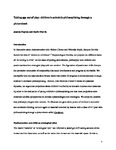Taking Age Out of Play: Children’s Animistic Philosophising through a Picturebook
| dc.contributor.author | Haynes, Joanna | |
| dc.contributor.author | Murris, K | |
| dc.date.accessioned | 2019-11-12T11:52:07Z | |
| dc.date.issued | 2019-12 | |
| dc.identifier.issn | 0305-1498 | |
| dc.identifier.issn | 1757-1634 | |
| dc.identifier.uri | http://hdl.handle.net/10026.1/15137 | |
| dc.description.abstract |
This paper emerges from experiences of putting picturebooks, philosophy with children and posthumanism into play. Responding to Derrida's notion of a ‘return to childhood’, we propose a different move of ‘re-turning to child/ren’, drawing from various entangled sources. First, the figuration of posthuman child (Murris, 2016) disrupts the conception of temporality that takes development and progress as inevitable. The posthuman child expresses the idea of the knowing subject as an unbounded sympoietic system. We put to work Miranda Fricker's notion of epistemic injustice to reanimate thought, with Tim Ingold and Jane Bennett. In respect of children's animistic philosophizing, our writing explores the materiality of philosophizing between adult/s and a class of 4–7-year-olds enquiring through an animated picturebook called Corduroy (Freeman, 1976). They are engaged in an epistemology of learning with, rather than about, the world. Ingold proposes that ‘knowing is movement to be taught by the world’ (2013:5) and that our inquiries should not set out to describe or represent the world but rather to open our perception to what is going on there, so we can respond to it. Making enquiries draws attention away from description and re-presentation to the movement, plurality and animatedness of knowing. | |
| dc.format.extent | 290-309 | |
| dc.language | en | |
| dc.language.iso | en | |
| dc.publisher | Edinburgh University Press | |
| dc.subject | Pediatric | |
| dc.title | Taking Age Out of Play: Children’s Animistic Philosophising through a Picturebook | |
| dc.type | journal-article | |
| dc.type | Journal Article | |
| plymouth.issue | 2 | |
| plymouth.volume | 41 | |
| plymouth.publication-status | Published | |
| plymouth.journal | Oxford Literary Review | |
| dc.identifier.doi | 10.3366/olr.2019.0284 | |
| plymouth.organisational-group | /Plymouth | |
| plymouth.organisational-group | /Plymouth/Faculty of Arts, Humanities and Business | |
| plymouth.organisational-group | /Plymouth/Faculty of Arts, Humanities and Business/Plymouth Institute of Education | |
| plymouth.organisational-group | /Plymouth/REF 2021 Researchers by UoA | |
| plymouth.organisational-group | /Plymouth/REF 2021 Researchers by UoA/UoA23 Education | |
| plymouth.organisational-group | /Plymouth/Research Groups | |
| plymouth.organisational-group | /Plymouth/Research Groups/Institute of Health and Community | |
| plymouth.organisational-group | /Plymouth/Users by role | |
| plymouth.organisational-group | /Plymouth/Users by role/Academics | |
| dcterms.dateAccepted | 2019-09-14 | |
| dc.rights.embargodate | 2019-12-11 | |
| dc.identifier.eissn | 1757-1634 | |
| dc.rights.embargoperiod | Not known | |
| rioxxterms.versionofrecord | 10.3366/olr.2019.0284 | |
| rioxxterms.licenseref.uri | http://www.rioxx.net/licenses/all-rights-reserved | |
| rioxxterms.type | Journal Article/Review |


